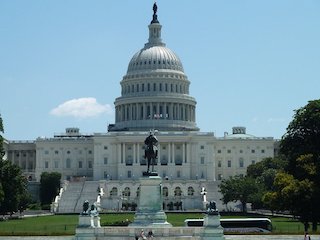A bipartisan group of senators, including the chairman and ranking member of the Senate Armed Services Committee, are again trying to persuade the FCC to reverse a 2020 decision to allow Ligado Networks to build out a broadband network in the L-band for mobile 5G transmissions. Senators Jim Inhofe (R-OK) and Jack Reed (D-RI), ranking member and chairman of the Senate Armed Services Committee, urged the Commission to reconsider granting the license modification request of Ligado Networks.
The lawmakers say Ligado’s plans risk interference with GPS reception and Satellite Communications operations. Joining Inhofe and Reed were Sens. Tammy Duckworth (D-IL), Mazie Hirono (D-HI), Mark Kelly (D-AZ), Mike Rounds (R-SD), Kyrsten Sinema (D-AZ) and Dan Sullivan (R-AK).
“Staying and reconsidering the Ligado Order is necessary to address the imminent risks associated with Ligado’s intention to ‘commence operations in the 1526-1536 MHz band on or after September 30, 2022,’ ” they wrote in a letter. “We remain gravely concerned that the Ligado Order fails to adequately protect adjacent band operations — including those related to GPS and satellite communications — from harmful interference impacting countless military and commercial activities.”
Inside Towers reported that in 2020, 15 government agencies, including the Department of Defense, Homeland Security, NASA, the FAA, the Department of Justice, and the Department of Transportation opposed the move based on safety considerations. Inhofe said at the time cell phone calls would be disrupted as well. “Cell phone networks rely on GPS to synchronize cell towers so calls can be passed seamlessly. If they experienced interference, your call could drop when moving from tower to tower,” said the Senator.
Ligado holds spectrum licenses in the 1.5-1.6 GHz range, including 30 MHz of L-band spectrum, and 1.670-1.675 GHz. Despite the opposition, the FCC voted to allow Ligado to modify its existing licenses in the 1.6 GHz band, adjacent to GPS providers and users.
When the FCC approved the Ligado modification in 2020, the agency’s engineers said harmful interference could be avoided, including by requiring a guard band between Ligado and adjacent-band GPS and a 99 percent reduction in power levels from Ligado’s original 2015 application. The Commission also said the company should “expeditiously” repair or replace any U.S. government device that experiences harmful interference. But it didn’t specify Ligado would be required to pay for replacements.
Networks President/CEO Doug Smith has said relatedly its 5G network is not going to disrupt any services, Inside Towers reported.
The FCC said it’s reviewing the letter. The National Academies of Sciences, Engineering and Medicine is planning to release on September 9, its review of the impacts of DoD use of GPS, just weeks before Ligado plans to go live, according to Breaking Defense.
In 2022, Ligado Networks partnered with Sony Semiconductor Israel to develop chipsets for Ligado’s 5G mobile satellite network for the Internet of Things. It’s working with Mavenir to deploy base stations for its 5G IoT network. And Ligado and Nokia are partnering on edge computing.
By Leslie Stimson, Inside Towers Washington Bureau Chief





Reader Interactions